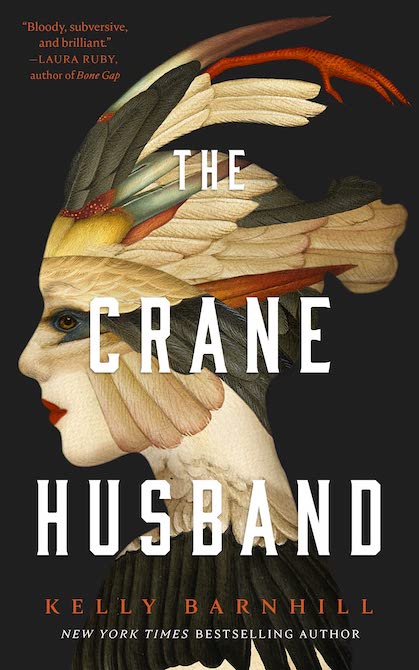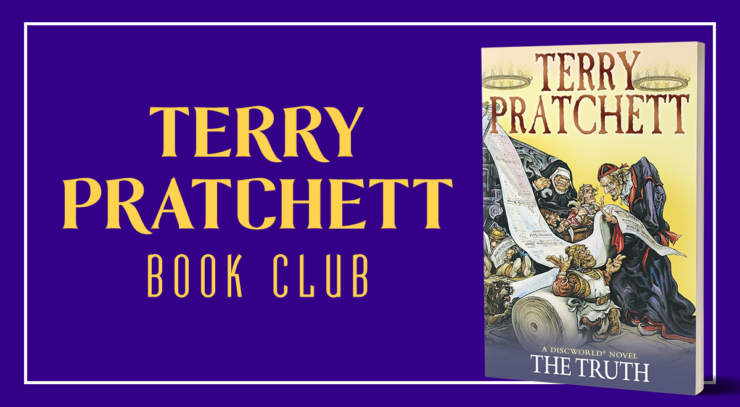I will now do my impression of a vampire taking an iconograph… *screams and turns to dust*
Summary
William’s office has two desks in it now, and people are coming to see him about jobs, news stories, and complaints about the stories already written. He hires a zombie named Mr. Bendy to write obituaries, a troll named Rocky to handle complaints, and Sacharissa has made the header of the paper fancier with bolder type and some engraving at the top. Charlie asks for more money from Tulip and Pin to pretend to be the Patrician and they agree. Lord Vetinari is reading the paper in good humor when someone knocks at his door but does not enter. The Patrician opens a secret compartment in his desk, selects a sharp weapon from the interior and goes to the door. Goodmountain tells William that the engravers had a major turnover and are looking to start their own paper, and suggests they put out a paper every day to compete. A vampire named Otto Chriek comes in to see about their iconographer position. William hires him only to find out that the light required to make iconography is extremely painful to him, but Otto presses on. The guild refuses to engrave their iconography, but Otto doesn’t think that will be a problem for him either. Rocky tells him that something’s happened at the palace, someone’s been killed—and Vetinari is said to have done it. They arrive at the palace and bother Detritus into letting them see Vimes.
Buy the Book


The Crane Husband
Vimes meets William and is told why he should give a statement to the paper. Vimes reads the report Carrot has taken down, noting that the facts given are ridiculous: The report reads that Lord Vetinari was found standing over Drumknott’s (stabbed) body with a knife, shouted that he was sorry, and was later found unconscious in the stables with a bag of money, apparently trying to escape. William tries to get a look at the crime scene and is kicked out by Cheery. He heads back to his offices to write up the story and put out the paper immediately when Mr. Slant and the Guild of Engravers show up to tell them that they’ve added printing to their charter and demand a thousand dollars from the Times or they must stop printing immediately. Sacharissa asks to see the charter and notes that it has not been signed by the Patrician, making the document useless. William threatens to write up the entire incident until the group leaves. They send the paper out and it sells like hotcakes. They begin getting invitations including one to Lady Selachii’s ball, which she demands they write up. Sacharissa insists that she doesn’t have money for a nice enough dress, but William tells her to go to his family’s townhouse and borrow one of his sisters’ many dresses.
Williams then goes to speak to Vimes, who refuses to tell him anything about the case and also tells him off for his reporting, though he does let him down to the cells to see Drumknott. (William also tells them he knows they keep a werewolf on payroll, though he wrongly assumes it’s Nobby.) Drumknott insists that he does not remember being stabbed by Vetinari at all, and he turns out to have a head injury in addition to his stab wound. The Patrician is still unconscious in the cells. William doesn’t get much information, but he leaves with an image of Vetinari’s dog, which Vimes has not-so-subtly asked him to run a picture of in the paper to see if anyone can find it. Vimes has already put two officers on William because he knows the man’s life is in danger. Tulip and Pin are angry because Mr. Slant failed to mention that Vetinari moves like a snake, which is part of the reason their job went not-so-smoothly. William finds that a new paper is being sold in the streets via the engraver’s guild—the Ankh-Morpork Inquirer, which is full of fake stories. He heads back to his offices and learns that they’re also being gouged for paper due to the Inquirer’s demand for it, and can barely afford it. William tries to brainstorm ways to make their paper more appealing as quickly as possible; they start talking about getting to print faster, getting images with color, and sending a clacks message to the king of Lancre.
Mr. Slant meets with Tulip and Pin and asks them what happened to Lord Vetinari’s dog. They insist no one warned them about the dog or said to do anything with it. Slant tells them they must find it or the whole scheme will unravel—the Watch has a werewolf, a werewolf can talk to a dog, and animals have been allowed in plenty of Ankh-Morpork courtrooms before. They demand more money, and try to find out who their employers are, but Slant won’t say. William and Goodmountain go to see Harry King, the man responsible for waste recycling and paper-making in the city. William pleads their case, but the man won’t sell to them… he does, however, tell them about a cart of paper that’s meant to go to the Inquirer, sitting at the edge of his yard, easily stolen. He also says that they better pay him their old paper price by end of month, and report on his daughter’s wedding. Sacharissa goes down to talk to Otto and accidentally grabs his dark light eel, seeing flashes of strange events and nearly fainting. This almost triggers Otto to fall off the blood wagon, and they have to get him a dead rat to help. He explains to Sacharissa that dark light might be the first light of the universe and therefore outside time. He shows pictures he’s taken with it; one of William shows his father lurking over his shoulder when he wasn’t present; another shows the crime scene but also two Vetinaris superimposed over it, looking at each other.
Commentary
Look, as stand-ins for Watergate go, this one is… I mean, it’s really not even close. And I appreciate that, because that would frankly be boring and also not in keeping with the political setup of Ankh-Morpork at all. Discworld stories are typically at their best when you take various other stories, real-world scandals/histories, and lots of puns and wordplay to create something new, and this book manages it effortlessly overall.
It’s just extra hilarious to me that they’re trying to make it look like Vetinari wants to embezzle from the city when the man wears austerity like plate armor. Ah yes, this guy, who barely eats or sleeps (and does so with no seeming care for flavor, richness, or comfort), whose fanciest accoutrement is a nice cane that he needs since getting shot, who rides around in a jet black carriage with no bells or accompanying whistles, this man really needs a bunch of cash to go live large somewhere. Like I get that the point is your average citizen doesn’t know that much about Vetinari, so they’d believe it, but if you’d literally ever even seen the dude, how could you buy that story.
I suppose it makes more sense to your average layperson than “oh, well, the Patrician of Ankh-Morpork is a next-level control freak, and being in charge of this entire city is honestly the safest? …way? to keep his mind occupied, so this is who we’re stuck with for the time being.”
And, of course, it’s not a Watch book, but… but you’ve got to have the Watch around because there’s a crime. Which does give Pratchett an opportunity he’d never had previously: The chance to show us the general public’s opinion of Sam Vimes. It really does make the whole gambit that much more delicious when you see that Vimes isn’t just an irritant to the city’s elite—he’s an upset to their “natural order.” We know people like Rust think that way, but that man is odious all the way through anyhow. Remembering that your average wealthy person thinks of anyone without money as a servant, and Vimes having the audacity not to behave as such, that’s a whole different level. He tells his officers to knock at the front door. Any front door.
And he’s Vetinari’s other dog, so you’ve got no one official to complain to about it.
The use of His Girl Friday-esque newspaper antics in this are so deftly executed that it feels like they’ve been present in Discworld books before, like it couldn’t be a new dynamic. That said, it’s extra enjoyable watching William figure out how newsmongering works on the fly. I want to mark it because this is something that Pratchett uses throughout the series to great success—the discovery of something that is a known quantity in the modern world, and the sort of crystallizing effect around the topic that occurs when you introduce it at speed.
We have the rapid clarity around the small items that truly make up the bulk of news, the belief that anything printed must be true, the unscrupulous methods and desires of those who peddle tabloid journalism, the sudden importance of the news “cycle” and how quickly it moves, the tactics needed to get information from difficult sources, and William’s stalwart belief that the truth is always worth pursuit. The parallel made between William and Harry King by King himself lends a different viewpoint: Some people just instinctively spend their lives sorting through trash until they find value. The only trouble is, what matters to William isn’t what matters to most people. Which is… exactly how that goes more often than not, I’m sorry to say.
Asides and little thoughts:
- The bit where Vetinari touches the button in his desk and there’s a bunch of sharp stuff surrounded by velvet in a secret drawer, SIR, your weapons get more tactile care than you give yourself, and I love you for it. (Also your dog gets better nutrient care with his finest meats, you’re just a weird sap about very specific instruments.)
- I… forgot that Vimes predates Benoit Blanc’s “It’s just DUMB” line of reasoning when he reads Carrot’s report of the attack. Loving this detective through line down the ages. (Also, I can just see him taking Carrot aside later and being like “You know the Patrician used to be an assassin, yes? It’s very important to me that you know he’s killed all manner of people.” Nothing but pure concern for his perfect idiot child.)
- Sure, plenty of Tulip’s drugs are things like rat poison cut with flour, but then again, most drugs are just poison diluted to manageable levels, so it’s not that weird, is it? I mean, it is, but is it?
Pratchettisms:
Mr. Longshaft smiled faintly as he buttered the toast, and William wondered why he always disliked people who said “no offense meant.” Maybe it was because they found it easier to say “no offense meant” than actually refrain from giving offense.
It sometimes seemed to William that the whole population of Ankh-Morpork was simply a mob waiting to happen.
William’s class understood that justice was like coal or potatoes. You ordered it when you needed it.
The man could rumple a helmet.
And William was good with words. The truth was what he told. Honesty was sometimes not the same thing.
The way of truthful-by-nature is as a bicycle race in a pair of sandpaper underpants, but William clung to an indisputable fact.
William felt the distinct unease of a well-educated man who has to confront the fact that the illiterate man watching him could probably out-think him three times over.
“In zer old country, zer scenery is psychotropic and knows vot is expected of it. Here, alas, people just look at you in a funny way.”
Next week we read up to:
“I’m going,” said William, “to see a dog about a man.”










